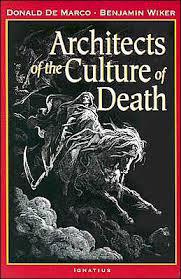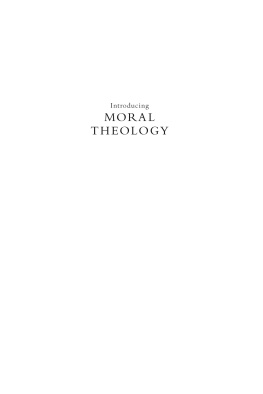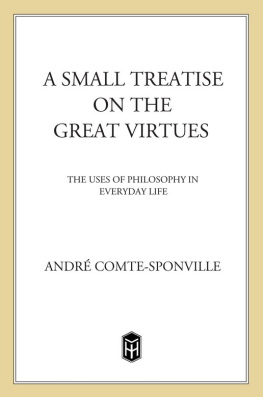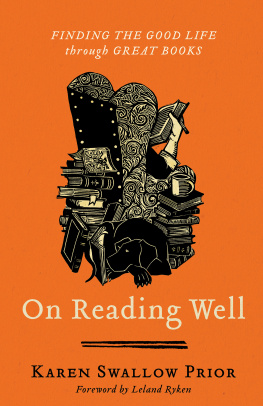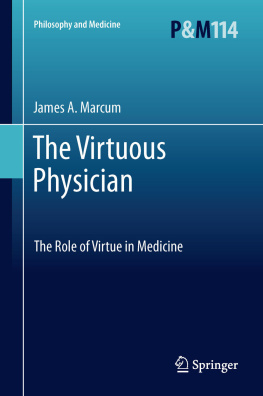THE
HEART OF
VIRTUE
DONALD DE MARCO
THE
HEART OF
VIRTUE
Lessons
from
Life and Literature
Illustrating
the
Beauty and Value of
Moral Character
IGNATIUS PRESS SAN FRANCISCO
Cover by Riz Boncan Marsella
1996 Ignatius Press, San Francisco
All rights reserved
ISBN 0-89870-568-1
Library of Congress catalogue number 95-79949
Printed in the United States of America
When wealth is lost,
nothing is lost;
When health is lost,
something is lost;
When character is lost,
all is lost.
Anonymous
Talent is nurtured in
solitude; character is
formed in the stormy
billows of the world.
Goethe
The virtues of great
men served me as a modern
mirror in which I might
adorn my own life.
Plutarch
Finally, brethren, whatever
is true, whatever is
honorable, whatever is just,
whatever is pure, whatever
is lovely, whatever is gracious,
if there is any excellence,
if there is anything
worthy of praise, think about
these things.
Saint Paul
To Peggy Markell
and
Tadeusz van Wollen
for their
clear insight,
kind inspiration,
and
gentle insistence
Contents
Acknowledgment
I T WAS STORMY. That and my flight schedule (Hartford-Springfield to Toronto to Calgary, Alberta, to Kamloops, British Columbia), with its minimal intervals between flights, seemed a most fitting way to celebrate the spirit of National Stress Awareness Day, April 16, 1994.
Almost predictably, inclement enroute weather delayed the arrival of Flight #1473 into Toronto. As a result, I was unable to make my connecting flight to Calgary. The best the airline could do for me was to send me to Vancouver, put me up in a hotel, and fly me to Kamloops the next day.
While waiting for the plane that would take me to Vancouver (which was two hours late from Paris), I was wondering what better plans the Great Scheduler in the Sky might have for me. Faith can be a wonderful aid in the management of stress.
I was seated in the departure lounge when I recognized a friend who lives in Vancouver. He also recognized me. We had spoken to each other two or three times after talks I had given in that city, and, although we had shared a number of common enthusiasms on those occasions, we could not consider ourselves to be close friends. So I was not offended when he said to me: You know, I dont think of you often. I was, however, surprised to hear what followed: But I did think of you just yesterday while in Miami. I had an inspiration that you should write a book about moral virtues, and that you should illustrate it with memorable stories from life and from literature. This revelation was all the more extraordinary because on that same day I had received a letter from a woman in up-state New York who also urged me to write the very same book. In fact, I had brought her letter with me for good luck.
There were other coincidences of a similarly startling nature. I asked my friend to tell me his seat assignment. As it turned out, we had been assigned adjacent seats! During the five-hour flight we talked about what virtues should go into the book, how they should be exemplified, and about divine synchronicity.
Synchronicity is Gods way of remaining anonymous, someone once said. That may be the case in more instances than we realize. One must be evergrateful for Gods Providence. But concerning this specific instance, I want to take the opportunity now provided me to express my gratitude to my two friends, for, without their gentle insistence, The Heart of Virtue would not exist.
September 28, 1995
Kitchener, Ontario
Prologue
I T IS NOT POSSIBLE to improve either our personal lives or our society apart from acquiring virtue. We are reluctant to do this, however, because we believe that our sole moral responsibility is to eliminate vice, which we think we can accomplish with a minimum of effort. Yet we lull ourselves into a dangerous moral complacency when we assume that vice is no more formidable a foe than a draft of cold air that we can keep out by slamming the door in its face. It is equally perilous to maintain that slogans are sufficiently powerful to keep the devil at bay. Just saying no to drugs, racism, prejudice, and all forms of sexual aggression does not transform them into gentle lambs that will obediently go away even if our no does mean no. Vices therefore invade and inhabit our lives. And while we fail to discern their lingering presence, we do remain outraged by crime. Yet crime is nothing less than the unseemly dividend that vice had always promised.
Saying no to vice and voicing indignation at crime logically presupposes the presence in us of positive and protecting virtues. But we often take these virtues for granted even when we have done nothing to understand, acquire, or develop them. Trying to become virtuous merely by excluding vice, however, is as unrealistic as trying to cultivate roses solely by eliminating weeds. After clearing the garden of weeds, one must still plant seeds or cuttings and nurture their growth; otherwise, the weeds simply return. The best way to exclude vices is to crowd them out with the presence of strong virtues. If we oppose crime, we must oppose vice, and if we oppose vice, we must promote virtue. Clifton Fadimans maxim is worth repeating: The formula for Utopia on earth remains always the same: to make a necessity of virtue.
Where strong virtues are lacking, the vices that rush in to fill the void often assume the mask of virtue. Dorothy Sayers has her own list of such counterfeit virtues, which she calls the Seven Deadly Virtues. They are: Respectability, Childishness, Mental Timidity, Dullness, Sentimentality, Censoriousness, and Depression of Spirits. Sayers is mindful of how easy it has been for human beings throughout the ages to pervert the seven foundational virtues into seven hapless imitations. The seven virtues that are the cornerstone of the moral life consist of three theological virtuesFaith, Hope, and Lovealong with the four cardinal virtues of Prudence, Justice, Fortitude, and Temperance. The first three, sometimes called supernatural virtues, are infused at baptism and correspond to the life of grace; while the cardinal virtues, although not entirely removed from sources of grace, are their more naturalistic counterparts. The theological virtues give us a focus that transcends us without excluding us. In this way they are the perfect antidotes to self-centeredness and its consequent vice, pride. The cardinal virtues, sometimes called the Human Virtues, give us a focus within ourselves that does not exclude othersa self-mastery for the purpose of self-giving. The Seven Deadly Imitations that more closely parallel these seven virtues as their sinister opposites are, respectively, Credulity, Expectation, Sentimentality, Cleverness, Legalism, Recklessness, and Tepidity. These mockeries of virtue more closely resemble the Seven Deadly SinsPride, Avarice, Envy, Wrath, Lust, Gluttony, and Slothwhich are wholly destructive of personality.
We are not born virtuous. Nature does not steep us in good habits. Nor does moral development take place by means of cultural osmosis. Virtues must be pursued.
Ye were not formed to live the life of brutes,
But virtue to pursue and knowledge high.
It is precisely the vigorous pursuit, acquisition, and cultivation of virtues that enable us to conquer vice. Falling into vice is as easy as falling off a ladder. To acquire virtue, however, is more arduous. The life of sin is a fall from coherence to chaos, according to Saint Thomas Aquinas, the life of virtue a climb from the many to the One.
Next page

